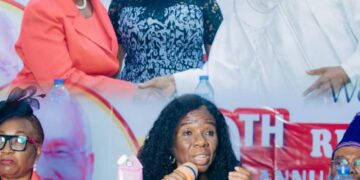By Oyo-Ita

The former Head of the Civil Service of the Federation, Mrs Winifred Ekanem Oyo-Ita, has called on Nigerian engineers to take a commanding role in driving the nation’s progress through innovative and sustainable practices.
Addressing the 9th Rev. Engr. Etteh I. Etteh Distinguished Annual Lecture, Oyo-Ita accentuated the indispensable contributions of engineers to economic modernisation, problem-solving, and positioning Nigeria for global competitiveness.
In her lecture, titled The Engineer in 21st Century Nigeria: A Delicate Balance of Economic Reality in Harnessing Professional Skills for Innovation and Development, Oyo-Ita spotlighted the transformative potential of engineering across sectors such as infrastructure, telecommunications, and energy.
She urged engineers to extend their expertise into emerging fields, including renewable energy, agriculture, and transportation, to confront Nigeria’s unique challenges. “The contributions of Nigerian engineers are evident, but overcoming obstacles like climate change, population growth, and economic volatility requires a mindset reset. Indigenous innovation, ingenious solutions, and strategic collaboration are imperative to achieving sustainable development,” she noted.
Advocating for the enhancement of local capacity, she underscored the need to foster indigenous technologies, citing solar energy solutions and local manufacturing as prime examples. She further called for research and development (R&D) centres to advance engineering capabilities and reduce dependence on imports. “Engineers must lead innovation efforts rather than waiting for policy directives. Developing cost-effective, locally sourced technologies is critical to addressing Nigeria’s realities,” she added.
Oyo-Ita also recommended educational reforms to equip future engineers with practical and innovative skills. She advocated for prioritising Science, Technology, Engineering, and Mathematics (STEM) education from early stages and integrating hands-on training and entrepreneurial programmes in tertiary institutions. “To nurture top-notch engineers, our educational system must focus on practical training in fields like renewable energy, industrial automation, and agricultural machinery,” she remarked, pointing to China and India as exemplary models.
She urged the government to institute policies that support certified engineers and eliminate quackery in the profession. She also called on the private sector to fund engineering innovations through venture capital and partnerships. “Transforming our economy demands continuous professional development, adequate funding, and access to cutting-edge tools for engineers to remain competitive,” Oyo-Ita stated.
Her discourse masterfully explored the interplay between economic realities and the professional skills required for engineers to emerge as agents of modernisation, innovation, and sustainable development. She illuminated critical issues facing Nigeria’s engineering sector and proposed actionable remedies to navigate the nation’s delicate economic circumstances.
“The Nigerian engineer of the 21st century must transcend technical proficiency to become a visionary leader capable of redefining the nation’s development narrative,” she concluded.
In response, the President of the Nigerian Society of Engineers (NSE), Engr. Margaret Oguntola, commended Oyo-Ita’s address, underscoring the association’s commitment to capacity-building initiatives and policy advocacy. Represented by Valerie Aderagba, Oguntola urged young engineers to seize leadership opportunities to shape Nigeria’s future.
Delivering opening remarks, the National Chairman of the Nigerian Institution of Civil Engineers, Dr Ezugwu, reflected on the legacy of Rev. Engr. Etteh, a trailblazer in civil engineering. He praised Etteh’s contributions to infrastructure development and mentorship through the firm Etteh Aro & Partners.
The event, which coincided with Rev. Engr. Etteh’s 89th birthday, also celebrated his enduring impact on the profession. Leading the tributes, Dr Ezugwu declared, “Happy birthday, sir,” while applauding his exemplary achievements.
Themed The Engineer in 21st Century Nigeria: A Delicate Balance of Economic Reality in Harnessing Professional Skills for Innovation and Development, this year’s lecture addressed the engineering profession’s challenges amid rapid technological advancements and economic complexities. Dr Ezugwu reiterated the pivotal role of engineers in driving innovation and economic growth. “As we navigate the challenges of the 21st century, balancing economic realities with leveraging our skills for innovation and development is essential,” he affirmed, urging stakeholders to collaborate in transforming Nigeria into a technological hub.
The event was chaired by Engr. Margaret Oguntola, FNSE, and attended by luminaries such as the COREN President, Prof. Sadiq Abubakar, FNSE, FAEng, and Engr. Sen. Femi Kila, FNSE, FNICE, among others.














